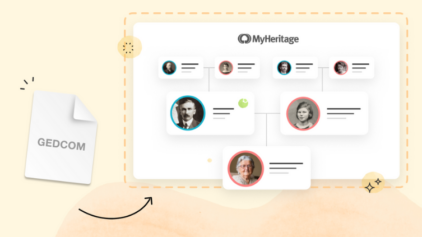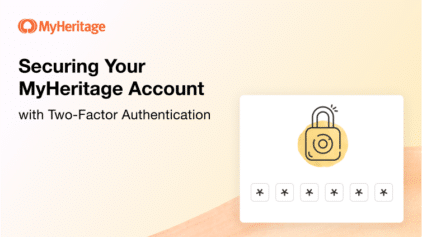After a tough cancer fight at age 68 (had been very healthy and strong until then) I began writing a memoir. It encompasses family and friends. It is a zeitgeist of the late 20th century as seen by my eyes, which should be interesting to my unborn great great nieces and nephews. I had never written anything much before.
Finally done last year. Took two years., all 125 pages of it. Had it published privately (50 copies) for about $600. I gave it only to close relatives and and a few very dear friends; the remaining 30 copies will be given away after I’m outa here.
This, and my genealogy of over 2000 relatives, will be a gift to my descendants that will last far longer than the meager money I leave behind.
The Power of Story: Yours, Mine and Ours
- By Esther


 This is a guest post by genealogy professional Thomas MacEntee. He specializes in the use of technology and social media to improve genealogical research and as a means of interacting with others in the family history community. His latest endeavor is Genealogy Bargains, a way to save money on genealogy and family history products and services.
This is a guest post by genealogy professional Thomas MacEntee. He specializes in the use of technology and social media to improve genealogical research and as a means of interacting with others in the family history community. His latest endeavor is Genealogy Bargains, a way to save money on genealogy and family history products and services.
“Mommy? Where are you?”
At age four, I almost drowned in a lake at my father’s hunting camp in upstate New York. It is one of my earliest memories that remain with me to this day. I remember looking up from the water and seeing my mother reach down for me. I could see her, almost clearly, yet she could not see me. And time stood still.
My mother saved me that day after I had wandered away from the rest of the family and slipped on the wet grass along the bank of the lake. Luckily, it was only a few seconds after I fell in that she realized something had happened. While on her hands and knees at the water’s edge, she frantically reached around the murky bottom until she was able to grab the waist of my pants and pull me out.
I was saved that day. It was one of several times when this gentle yet strong woman would agitate the waters of my life, to save me and then soothe me to make those waters calm.
* * *
One Story, Many Perspectives
I wrote the small story above in 2009 based on not just my recollections, but on an interview with my mother back in 2002. This was just as her early-onset dementia, a precursor to Alzheimer’s disease, was setting in and I was scrambling to save our family stories. While the near drowning was my earliest memory, I needed my mother’s input, recall and perspective to fill out the story so I could preserve it for the future.
From that interview, I then branched out to other family members either who were there or who had heard of the incident. I discovered that while I had swallowed some water and I was crying, I was seemingly unharmed on that sunny day in autumn. I remember riding back home in someone’s truck, wrapped in a blanket. I also know to this day that swimming and being in water is one of my least favorite activities.
Without the help of family members and others, an important event in my life would have gone undocumented and be lost for the ages. How many of your own life stories are waiting to be preserved and then shared with others?
Who Is Capturing Your Family Stories?
I have been preserving my own family’s history and stories for more than 20 years, and I have found the process of evaluating family stories and ensuring that they endure for future generations to be extremely rewarding. Here is what I have found to be true when it comes to taking on the responsibility of capturing the stories that matter:
- Don’t delay. While it can seem overwhelming to record interviews with family members and to preserve them, don’t put it off for “another day.” In addition, don’t expect someone else in the family to take on the task. For each day you delay, you risk losing a family member and their memories. Stories preserved on media – slides, film and more – break down and deteriorate over time.
- Make a plan. Even big projects that seem too difficult to take on are made easier when viewed as smaller tasks. Lists are your friend: make a list of “to do” and “action items,” as well as a list of existing items needing preservation.
- Get help. Yes, the duty of story keeping usually falls to one person in a family but, if you look closely, you will notice how that person enlists others to help out. Seek out those with special skills such as writing, converting files, scanning photos, and more. Set up “work days” when family members meet to accomplish important tasks. Also, tap into the vibrant community of professionals and vendors who sell their services and knowledge of family history preservation.
- Think long term. When setting your sights on preserving stories and mementos, think decades in the future, not just years. Make sure digitized items are stored using the latest technology and employ multiple backups. Keep up with changes to technology and upgrade – before it is too late.
- Pass it on. Preserving your family’s history is more than just work; it can be a journey of discovery for you as well. Take time to document what you are doing, your thoughts and feelings – perhaps in a journal or online. Then look to the next generation of story keepers and make sure they understand the importance of family history preservation.
Tools for Documenting Your Life and the Lives of Others
The genealogy community is currently focusing on family history stories during National Novel Writing Month (NaNoWriMo) and many are working to ensure that all family stories are saved for the future. What can you do to be a part of this movement? Here are some ideas:
- One Sentence Diary: This free website prompts you to write one sentence each day about your life. An easy way to capture your memories each and every day.
- LiveScribe Echo Smartpen: This amazing device not only records everything you write but also what you hear during an interview or family discussion so you never miss a word! “Smartpens record everything you write and hear so you’ll never miss a word. Replay your meetings or lectures simply by tapping on your notes*. The free Echo Desktop application saves your notes and recordings to your computer for fast, easy access to what is important. Search for words within your notes and find what you need fast. Easily send and share your notes and audio via email or a variety of other sites and services.”
- Saving Memories Forever: An easy-to-use app for Android and iOS devices, Saving Memories Forever not only records your stories and interviews, it also offers prompts to get your family sharing those stories!
- Flip-Pal® mobile scanner – now with StoryScans™: One effective way to bring out the family stories and to get different voices and perspectives is to bring out the family photos! The Flip-Pal mobile scanner is a great tool for scanning any sized photo and now it has a great feature: StoryScans which can capture the audio storytelling about the photo being scanned.
- Treelines: Treelines bills itself as “a robust storytelling platform with full family tree integration.” Click here to see a sample “story line.” You can upload photos, enter text and even upload a family tree file (in GEDCOM format), but you can’t upload audio files of interviews with family. The end product appears along a timeline for a specific ancestor.
- StoryWorth: Billing itself as a way for anyone who wants to . . . “learn about family, connect with loved ones, and preserve memories,” StoryWorth will prompt you weekly with “questions you’ve never thought to ask” about your family. A neat feature is the ability for relatives to add their own perspectives via email or record a story via voicemail.
- Preserving Your Family’s Oral History and Stories: One of my best-selling books (Kindle or PDF) offers a strategic plan covering technology, interview questions and more, to ensure that your family stories are preserved for years to come.
Once you begin to build a library of family stories, a great place to put them to work is at MyHeritage. Added to your family tree, the power of those stories will help keep your family members engaged in your family history research.
© 2015, copyright Thomas MacEntee. All rights reserved.










Geoffrey J. Gill
November 30, 2015
These seem to be great tools to document both your own life and that of the entire family. You are quite right — time is of the essence. As I currently work with the genealogy of my family, I often wish I had been able to quiz my Mother & Father and aunts and uncles to a much greater extent. Many in our family don’t seem to have much time for genealogy. I think they are making a mistake.